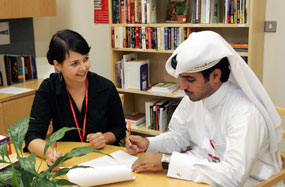Goal is to nurture academic and non-academic writing skills
November,2007

Autumn Watts working with Mohamed Al Hajri,
first year pre-medical student
Some 50 delegates from universities across the Middle East convened in Doha on October 26 and 27 for the Middle East-North Africa Writing Centers Symposium to discuss best practice for a writing center on campus.
Topics under discussions included developing students' writing skills in academic and non-academic aspects, and encouraging faculty and staff to join the writing center activities.
Delegates were invited by the Qatar Writing Centers Network, an informal group comprising directors of the centers in Weill Cornell Medical College in Qatar (WCMC-Q), Carnegie Mellon University in Qatar, Georgetown University School of Foreign Service in Qatar, Texas A&M University at Qatar (TAMUQ), Virginia Commonwealth University in Qatar and the College of the North Atlantic-Qatar.
"Writing centers are there to help others communicate clearly. We want a center to be equipped and ready to respond to all needs. It is important to raise awareness about the different activities of the center," said Michelle Eodice, keynote speaker at the symposium, and Director of the writing center at the University of Oklahoma and president elect of the International Writing Centers Association.
One of the main misconceptions about a writing center is that it targets mid-level learners. "The writing center is for all levels. We look at students, faculty and staff at WCMC-Q as one community. We want to nurture their academic and non-academic writing skills - we are here to support them," said Autumn Watts, WCMC-Q's writing center coordinator.
"We also want to expand the writing center's activities and link it to other writing centers in Education City and elsewhere in the region," added Watts.
Established in 2005, the WCMC-Q writing center provides free consultation and collaborative writing support at any level for all types of writing. It also provides the workshop series, which focuses on a variety of topics including thesis development, literature analysis, and public speaking.
Working in groups, participants in the Symposium exchanged ideas and experience about the challenges and opportunities they have. "The University of Alhosn was established a few years ago. There is no writing center on the campus, but the symposium helped me understand the mechanics of a center," said Professor Hassan Mustapha, Department of English, University of Alhosn in Abu Dhabi, United Arab Emirates.
One outcome was the formation of a regional organization for writing centers to help link them together and engage in more targeted activities. In addition to Watts, the Board will include faculty members from Qatar University, Bahrain University, Oman College of Technology, American University in Beirut and Shahid Chamran University in Iran, among other institutions.
Report by Mohamed Amasha
